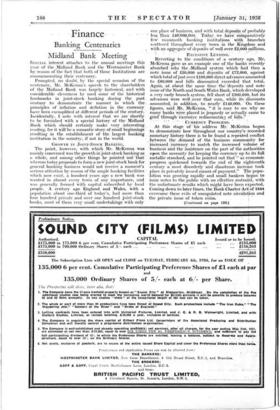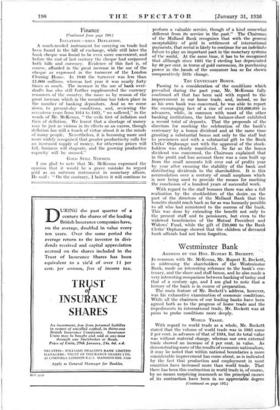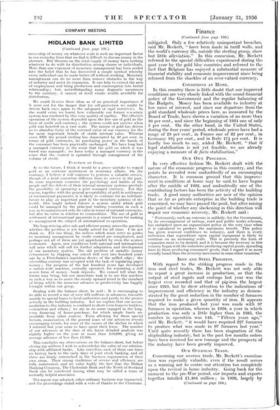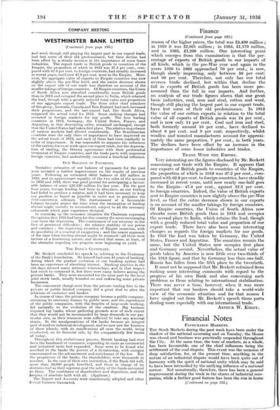Banking Centenaries
Finance- -
Midland Bank Meeting
SPECIAL interest attaches to the annual meetings this year of the ,Midland, Bank and the Westminster . Rank by reason of the fact that both of those Institutions are commemorating their centenary.
Prompted, no doubt, by the special occasion of the centenary, Mr. McKenna's speech to the shareholders of the Midland Bank was largely historical, and with considerable cleverness he used some of the historical landmarks in joint-stock banking , during the past century to demonstrate the manner, in whiCh the principles of inflation and deflation in the :curreney have been exemplified at different periods of the Century. Incidentally, I note with interest that we are shortly to be furnished with a special history of the Midland Bank which .should certainly make -very . interesting reading, for it, be a romantic story of small beginnings resulting in the .establishment of the largest banking institution in the country, if not in the world.
GItOWTH 'IN JOINT-STOCK BANKING.
The point, however, with which Mr. McKenna was mainly concerned was the growth in joint-stock banking as a whole, and among other things he pointed but-That whereas today proposals to form a new joint-stock bank fOr general banking business would not receive a moment's serious attention by reason of the ample banking facilities which now exist, a hundred years ago a new bank was wanted in almOst ' every town of any importance, and was generally formed with capital subscribed by local people. A century ago England. and Wales,. . with a population about one-third of today's, had more than four hundred private and over one hundred joint-stock banks, most of them very small undertakings with only one place of business, and with total deposits of probably less- than $.46,1i00,600. Today-- We -hive Comparatively few mammoth banking institutions with branches scattered throughout every town in the Kingdom and with' an aggregate of deposits of well over zt000 millions. EXCESSIVE -LENDING.
Reverting to the conditions of a century ago, Mr. McKenna gave as an example one of. the banks recently absorbed into the. -Midland system which had then a note issue Of 180,000 and deposits 'of £72,000, against which total of just over £100,000 direct advances amounted to. £80,000 and bills discounted exceeded that total. Again, ..at .,abOut the same time the -!deposits and note issue of the NOrth and South Wales Bank, which developed a very early branch system, fell short of £200,000, but its advances were well over' that sum, . while -its !discounts amounted; additiOn,• to nearly '1140;000. 'On these figures, said Mr. McKenna, t` it iS easy to see. why so many hanks were placed in jeopardy or actually came to grief through 'excessive rediscounting of bills.- CURRENCY PROBLEMS.
At this stage' of 'his • address Mr. McKenna began to .demonstrate how throughout our country's :recorded monetary, history there is to be found a repeated .conflict between the demand of • the business. community for 'currency ncy to match the increased volume of , . and the 'busineSS and the insistence. on the part of the authorities upon the necessity for keeping the currency up to its full metallic standard, and he pointed out that as economic progress quickened towards the end of the eighteenth century a most disorderly and disastrous increase took place in privately issued means of payment." The popu- lation was growing rapidly and small bankers began to issue notes to thepublic with no effective restraint, with the unfortunate results which might have been expected. Coming down to litter times, the l3ank -Charter Act:of 1844 overcame these evils of unregulated note circulation and the private issue ,of token coins.
(Continued on page 190.)
Finance
(Continued from page 188.)
INFLATION—THEN DEFLATION.
A much-needed instrument for carrying on trade had been found in the bill of exchange, while still later the hank cheque was found to be even more convenient, and before the end of last century the cheque had surpassed both bills and currency. Evidence of this fact is, of course, afforded in the great increase in the use of the cheque as • expressed in the turnover of the London- Clearing House. In 1840 the turnover was less than £1,000 millions, whereas last year it was nearly forty times as much. The increase in the use of bank over- drafts has also still further supplemented the currency resources of the country, the more so by reason of the great increase which in the meantime has taken place in the .number of banking depositors. And so we come down to present-day conditions, and, reviewing the seventeen years from 1914 to 1931, " we suffered," in the words of Mr. McKenna, " the evils first of inflation and then of deflation. We learnt that a shortage of money may be just as vicious in its effects as an excess, though deflation has still a touch of virtue about it in the minds of many people. Nevertheless, it is becoming more and more widely recognised that greater productivity calls for an increased supply of money, for otherwise prices will fall, business will stagnate, and the growing productive capacity will be unused."
GOLD STILL NEEDED.
I am glad to note that Mr. McKenna expressed the Opinion that it would be a grave mistake to regard gold as an outworn instrument in monetary affairs. He said : "'On the contrary, I believe it will continue to perform a valuable service, though of a kind somewhat different from its service in the past." The Chairman of the Midland Bank recognises that with the general . acceptability of gold in settlement of international paymentS, that metal is likely to continue for an indefinite future to play an important part in the monetary systems of the world., At the same time, it has to be recognised that although since 1931 the £ sterling has depreciated by 40 per cent. in terms of gold currencies, its purchasing power in the ,hands_ of the consumer has so far shown comparatively little change.
THE CENTENARY BONUS. Passing to a consideration of the conditions which prevailed during the past year, Mr. McKenna fully confirmed all that has been said with regard to the improvement in our home trade, and, indeed, so far as his own bank was concerned, he was able to report the encouraging fact of a rise of over £13,000,000 in advances, while, in common with most of the other banking institutions, the latest balance-sheet exhibited a record total of deposits. That the proposals of the directors for marking the celebration of the bank's centenary by a bonus dividend and at the same time granting a substantial bonus not only to the staff but to pensioners and with a substantial gift to the Bank Clerks' Orphanage met with the approval of the stock- holders was clearly manifested. So far as the bonus dividend was concerned, the Chairman explained that in the profit and loss account there was a sum built up from the small amounts left over out of profits year by year after ensuring the stability of the bank and distributing dividends to the shareholders. It is this accumulation over a century of small surpluses which is now being used to provide the means for marking the conclusion of a hundred years of successful Work.
With regard to the staff bonuses there was also a full realisation by the stockholders of the desire.,. on the part of the directors of the Midland Bank that the benefits should reach back as far as was humanly possible to all who had ministered to the success of the bank. This was done by extending the benefit not only to the present staff and to pensioners, but even to the widowed beneficiaries of the Mutual Provident and Widows' Fund, while the gift of £20,000 to the Bank Clerks' Orphanage showed that the children of deceased bank officials had not been forgotten.
Westminster Bank
ADDRESS BY THE HON. RUPERT E. BECKETT.
IN common with Mr. McKenna, Mr. Rupert E. Beckett, in addressing the shareholders of the Westminster Bank, made an interesting reference to the bank's cen- tenary, and the share and staff bonus, and he also made a very interesting comparison between banking of today and that of a century ago, and I am glad to note that a history of the bank is in course of preparation.
The main feature of Mr. Beckett's address, however, was his exhaustive examination of economic conditions. While all the chairmen of our leading banks have been agreed both as to the progress of home trade and the impediments to international trade, Mr. Beckett was at pains to probe conditions more deeply.
WORLD TRADE.
With regard to world trade as a whole, Mr. Beckett stated that the volume of world trade was in 1935 some 2 per cent. in advance of that of 1934, but its total value was without material change, whereas our own external trade showed an increase of 5 per cent. in value. As demonstrating some of the results of economic nationalism, it may be noted that within national boundaries a more considerable improvement has come about, as is indicated by the fact that production and employment in most countries have increased more than world trade. That there has been this contraction in world trade is, of course, by no means surprising inasmuch as the principal causes of its contraction have been in no appreciable degree (Continued on page 192.)
Finance
(Continued from page 190.) mitigated. Only a few relatively unimportant breaches, said Mr. Beckett, " have been made in tariff walls, and the world's currency ills, outside the sterling group, show but little alleviation." In this connexion, Mr. Beckett referred. to the special difficulties experienced during the past year by the gold bloc countries and referred to the fact that Belgium has enjoyed a substantial measure of financial stability and economic improvement since being released from the shackles of an over-valued currency.
CONDITIONS AT HOME..
In this country there-is little doubt that our improved conditions are very closely linked with the sound financial policy of the Government and the regular balancing of the Budgets. Money has been available to industry at low rates of interest, and since our departure from the gold standard wholesale prices here, as measured by the Board of Trade, have shown a variation of no more than 10 per cent., and since the beginning of 1934 one of only 5 per cent. On the other hand, in the United States, during the four years' period, wholesale prices have had a range of 29 per cent., in France one of 32 per cent., in Germany 16 per cent., and in Italy 17i per cent. It is hardly too much to say, added Mr. Beckett, " that if legal stabilisation is not yet feasible, we are already enjoying a measure of de facto stabilisation."
OUR OWN PROGRESS.
In very effective fashion Mr. Beckett dealt with the nature of the economic progress in this country, and the points he revealed were undoubtedly of an encouraging character. It is common ground that this improve- ment in conditions at home may be said,to have begun after the middle of 1932, and undoubtedly one of the contributing factors has been the activity of the building trade. A good many authorities are now of the opinion that so far as private enterprise in the 'building trade is concerned, we may have passed the peak, but after raising the point of whether any slackening in this direction will impair our economic recovery, Mr. Beckett said : " Fortunately, such an outcome.is unlikely, for the Government? by its encouragement of railway, road and public worki schemes, has embarked upon an expansionist policy at the very time when it is calculated to produce the maximum benefit. This policy has given renewed confidence to industry, and there is every, indication that expenditure upon capital equipment is likely to continue on an increasing scale. This is precisely the form of expansion most to he desired, and it is because the recovery in thici country began with the industries producing capital goods, spreading, later to those producing consumers' goods, that I regard it as more soundly based than the recovery movement in some other countries:'
IRON AND STEEL PROGRESS.
With regard to the striking progresS made • in the iron and steel trades, Mr. Beckett was not only able to report a great increase in production, so that the output of steel ingots and castings last year was the largest ever recorded and that of pig-iron the largest since 1929, but he drew attention to the indications of improvement and efficiency in the industry as demon- strated by the great reduction in the number of furnaces required to make a given quantity of iron. It appears that the iron produced last year was made with 97 furnaces in operation, whereas in 1928, a year in which production was only a little higher than in 1935, the number in operation was 143. " Fifteen years ago," said Mr. Beckett, " it would have required 227 furnaces to produce what was made in 97 furnaces last year." Until quite recently there has been stagnation of the shipbuilding industry, but in the past few months orders have been received for new tonnage and the prospects of the industry have been greatly improved.
OUR OVERSEAS TRADE.
Concerning our oversea trade, Mr. Beckett's examina- tion was especially valuable, even if the result serves as a warning not to centre our attention too completely upon the revival in home industry. Going back for the moment to the pre-War period, our imports and exports together totalled £1,404 million ; in 1920, largely by (Continued on page 194.) .
Finance -
(Continued from page 191)
reason of the higher prices, the total was £3,490 million ; in 1929 it was £2,061 million ; in 1934, £1,179 million, and in 1935, £1,238 million. One interesting point which emerges from this examination is that the per- centage of !exports of British goods to our imports of all kinds, which in the pre-War year and again in.:the years =1920 to 1923 approached 70per cent., is now, though slowly improving, only between en 50 Per Cent: and 60 per cent. Therefore, not only has our total oversea trade declined, but within that decline . the fall in exports of British goods has been more pro- nounced than the fall in our imports. And further, an analysis of our trade figures -shows that our great basic industries, coal, iron and steel, cotton and :wool, though still playing the largest part in our export trade, have lost some of their old predominance. In 1913 the value of our cotton exports in relation to the total value of all exports of British goods was 24 per cent., and is now only 14 per cent. Coal and iron and steel, both formerly around 10 per cent., have declined to about 8 per cent. and 9 per cent. respectively, whilst Woollen and worsted manufactures account for approxi- mately the same proportion, 7 per cent., in both years. The declines have been offset by an increase in the importance of some lesser industries and trades.
TRADE WITH THE EMPIRE.
Very interesting are the figures disclosed by Mr. Beckett concerning our trade with the Empire. It appears that our exports of British goods to countries of the Empire, the proportion of which in 1913 was 37.2 per cent., coin- pared with 62.8 per cent.. to foreign countries, have steadily increased in recent years, until now nearly one-half goes to the Empire-47.8 per cent., against 52.2 per cent. to foreign countries. Indeed, the value of British exports sent to Empire countries is now slightly above the pre-War level, so that the entire decrease shown in our exports is On account 'of the smaller takings by foreign countriera. Of Empire countries, the - Union of_ South Africa now absorbs more British goods than in 1913 and occupies the second place to India, which retains the lead, though with a greatly reduced total value and proportiett of our export trade. There have also been some interesting changes as regards the foreign markets for our goods. In 1913 the lead was taken by Germany, the United States, France and Argentina. The countries remain the same, but the United States now occupies first place and Germany second. Nevertheless, the actual value of goods taken by America is now little over two-thirds of the 1913 figure, and that by Germany less than one-half. Russia has fallen from the fifth place to the twentieth. It must not be supposed that Mr. Beckett refrained from making some interesting comments with regard to the progress of his own Bank and also concerning such problems as those relating to international stabilisation. There was never a time, however, when it was more important that our bankers should take a world-wide view of the economic situation and for that reason I. have singled out from Mr. Beckett's speech those parts dealing more especially with our international trade.
ARTHUR W. KIDDY.













































 Previous page
Previous page